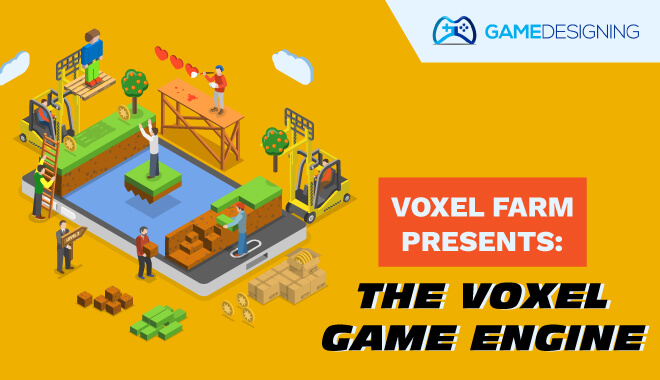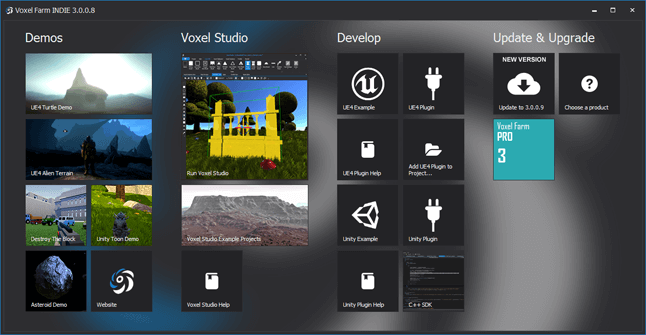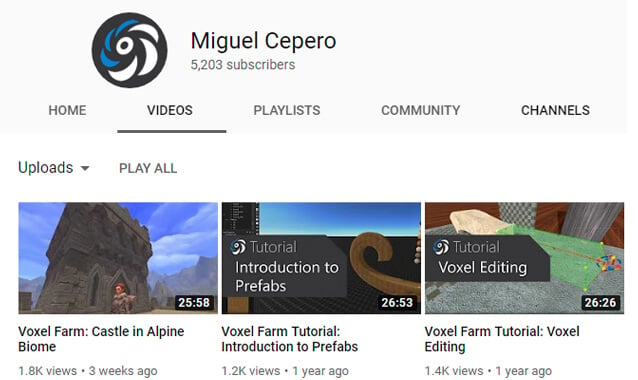
“I’m using Voxel Farm in my project… It’s not free, but definitely worth the money.” – Reddit user Ninlilizi
As gamers and followers of the newest tech, we are always looking for new things to advance gaming. Whether that is through a game, or the engine being developed to bring us those games to change the face of gaming.
What will be the next Fortnite? Or Minecraft? These are all questions on everyone’s minds not only in the industry but in the minds of gamers eager to experience the newest technology. With new, emerging engines, like Voxel Farm, gamers and creators move ever closer to these answers they seek. Smaller engines, like Godot, provide a good starting base for a developer breaking into the industry, but the engine Voxel Farm is creating new ways to view games.
Voxel Farm
‘Create Impossibly Beautiful Worlds’, the Voxel Farm website promises developers. In their own words:
“Voxel Farm is a next generation procedural voxel engine. Create rich, massive worlds for games, movies, TV shows and business applications. Allow your users to build and destroy at will in a truly sandbox environment.”
Something that struck me regarding Voxel was its compatibility with two powerhouses of game development: the two iconic engines—Unreal and Unity. Along with this compatibility is the fact that Voxel Farm has some of the biggest studios as clients—EA and Take-Two, for example. This impressive client list, to me, is all I need to know to become interested in the engine.
Voxel Farm, based out of Brossard, Quebec, Canada, the company is dedicated to allowing developers to enhance the worlds in which characters interact. It was created by Miguel Cepero, Voxel Farm
Echoing my earlier words on Minecraft, coincidentally, Voxel Farm used its tools to create a breathtaking version of Minecraft. Gone are the rudimentary yet effective pixels of our favorite world-building game. Here instead is a photorealistic depiction of the random procedure worlds we all know by heart. In the 38-minute video, I watched the player carve rock out of a craggy cliff face and build his house in an insanely detailed environment that reminds me of a lot of the Steam game Rust.
Not only that, but the far-off environment evoked a feel of the Lord of the Rings franchise; I could just imagine seeing the might city of Minas Tirith in the distance from The Return of the King. Personally, the detail and depth make me wish for an actual release of this beautiful version of Minecraft. It brings a realism that perhaps some gamers desire—I know I sure do.
Prices and Packages and Licenses

This is a serious engine to overhaul visuals and models, so it shouldn’t be much of a surprise that it may cost you. Since this engine is marketed more toward the heavy hitters of the industry—EA, for example—Voxel Farm can charge what they want. Here are some of the packages that you can purchase and download:
Voxel Farm Voxel Studio 3—$19 a year
This package includes World-building, Voxel editing, Cloud Support, and Procedural Generation.
I would probably recommend this to the developer who is trying to branch out their gaming engine potential but doesn’t want to break the bank. I think this is a safe option, as it introduces you to the Voxel Farm engine and allows you to experience the basics of its interface and capabilities.
Voxel Farm Indie 3—$295 a year
This includes UE4 and Unity Support, Voxel Studio, Binary SDK, Windows Only.
Voxel Farm Pro 3—$995 a year
The most expensive, (available for purchase from the website, that is), but perhaps most useful to bigger developers, this package includes the following: UE4 and Unity Support, Voxel Studio, Partial Source Code SDK, Multiplatform
This package is authentic. It allows the user to do almost anything that they can imagine within the engine.
Voxel Farm Triple-A 3—Contact only
Unfortunately, peasants like me cannot access the price range for the ultimate package from Voxel Farm. I assume that this is for the cream of the crop of game development teams.
Trial Version—30 days free
We all know the trial version of things. This allows a user to play around with the engine for 30 days, and the user must decide whether or not to use the engine after it expires. My money is on for license renewal.
Let’s break these licenses down further.
1 Creator: This license allows the user to build any terrain and play around with structures and make textures. The creator’s dream.
2. Indie: allows access to the engine’s code. Gives the possibility to upload your project to the Unreal and Unity engines
3. Pro: More access to the code and further creative potential. This allows you to start creating a legitimate game that you can export to the engines.
If you are having difficulty choosing the license that would work best for you or your project, they even provide a selection wizard where you check off your essential needs and they will match you up with the license that fits you.
Pros and Cons
Pros
- The potential for beautiful environments -Guys, seriously, if you haven’t already checked out the horsepower that Voxel Farm is packing, you need to do yourself a favor and look. Harnessing this graphical potential can develop and modify the graphics of countless games, adding new visuals as well as new points of view on titles we are familiar with.
- Hands-on creator – Miguel Cepero is a hands-on leader. He runs his blog, Procedural World, on BlogSpot. He offers tips and tutorials via this blog, as well as the, (very hard to pin down and discuss), definitions of what a voxel is. He is extremely knowledgeable in not only voxels, but it is evident that his developing and computing prowess is truly impressive.
- Integration with Unreal Engine – Voxel works hand in hand with Unreal and Unity, ensuring that the tools that you would be working with would be some of the best possible quality regarding gaming visuals. The licenses granted by Voxel Farm allow the user to have amazing access to the toolkit and gives users the possibility of uploading their game or project to Unreal 3 or Unity engines. This is game development made easy; the middleman is cut out and you can have your project running on your desired engine by simply exporting it. We all know and love games using these engines. Borderlands, Gears of War, Bioshock, the list goes on. It bodes well for both Voxel Farm and game developers that such a robust toolset is available.
- Exportation – You can export your project to Unreal 3 and Unity easily. This allows you to further tweak your game using the desired engine. Or you could find that you initially thought that a game in Unreal 3 works better in Unity. Never fear—that can be remedied.
- Beautiful visuals – We have already gone over it, but the visuals in use here are unbelievable. I honestly love to watch Miguel Cepero’s videos sometimes just for the visuals. Just check out any video or screenshot using the Voxel Farm engine and they will do all the explaining for me.
Cons
- Price – This may be more difficult for up-and-coming game developers to get their hands on. The high price range may stifle some ambitions you may have. If you have the cash, that’s great, I’m just thinking of the little guy here!
- Difficulty and Bugs – Unlike some other engines, Voxel Farm might prove to have a more difficult learning curve. And as this is still an ever-changing and constantly updated engine, more features and things might bog you down if you aren’t well-versed enough in the programs. Even though the tutorials on Voxel Farm are extensive, I have seen people on the internet express some frustration with the inability to make something work. Are these bugs or the user not being aware of a feature? I can’t exactly tell, but it isn’t as easy as it seems.
Voxel Farm Game Engine Tutorials
Tutorial 1: Miguel Cepero’s YouTube Channel

Why not bypass a lot of trouble for yourself and head over to the creator of the engine, Mr. Cepero’s YouTube channel? In his videos, Miguel shows the viewers tutorials on how to properly use Voxel Farm. His introduction video outlines the basic info of the engine, all while playing around with the impressive visuals.
He has a handful of intro videos for different aspects, as well as his projects that are in development. It’s very interesting to see the master at work.
Tutorial: Voxel Farm
Yes, another easily accessible tutorial from the people who helped develop it. This may be the best tutorial of Voxel Farm available. I warn you though: clicking into the tutorial on Voxel Farm will blow you away. Pages upon pages of whatever you could ever need help with are right there on the site. Need help with Voxel Farm on Unreal 3?
There is an entire page, (plus subsections), dedicated to that. Same with the use of Unity and other impressive lists like Procedural generation and Voxel Editor. This would be my first stop, as it’s comprehensive and exhaustive. Visit Voxel Farm Doc.
Tutorial: Procworld
I mentioned the BlogSpot before, and here it is again. You have 3 greats sources for the Voxel Farm engine, all of them by people who are extremely familiar with them. This blog is suited more for the theory that will be used when operating Voxel Farm.
It introduces us to what exactly a ‘voxel’ is, (for those wondering, Miguel Cepero says: “To help understand why voxels matter today, we need a different analogy. If I had enough time, I would say voxels are like triangles.”), and different geometric practices that the developers use in the engine.
They have sidebar links with tags to help a user easily find whatever they are looking for specifically. Visit the Procworld website here.
Tutorial: Hurtful Toad
I found this great little channel for helping with Voxel Farm. Hurtful Toad walks us through the steps to take when dealing with Unity. It includes an hour-long video where he experiments with foliage, and even includes a cool little demo on the engine itself on his channel.
Tutorial: Cyboreal Online Voxel Farm Tutorials
This website is insanely detailed. While using specific examples of their project, the posters at cybeoreal display what Voxel Farm can do with wild specificity. If you scroll through the posts, I can guarantee that you can find whatever it is that you’re specifically looking for with the engine. Check the website here.
In Conclusion
With these guidelines, whether you are using the trial license or the king of licenses, the Triple-A 3, you should be able to better work on your project using Voxel Farm.
The mainstreaming of game engines for more casual use has led to these dreams of more beautiful and detailed environments. Like the Minecraft video in Voxel Farm, I believe that many of our favorite games, (and future titles), have the potential to look stunning and breathe new and improved life into them.
If you were to use Voxel Farm, you would have a leg up in comparison with other engines. With the ease of exporting to Unreal 3 or Unity and creator Miguel Cepero leading the way, Voxel Farm has a bright future.
